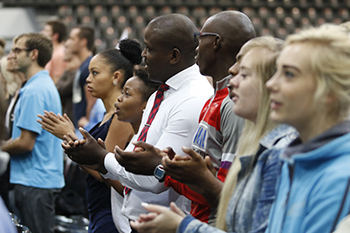
|
The Campus Ministries Forum and South African Council of Churches (Free State) have organised a walk for peace and justice from the Main Building to the Callie Human Centre on the Bloemfontein Campus of the University of the Free State (UFS) on Tuesday 1 March 2016. This walk was followed by a prayer meeting at the Callie Human Centre.
Pastors from the Campus Ministries Forum of the South African Council of Churches (Free State) led a group of more than 350 students and staff in praise and worship, followed by prayers in English, Afrikaans, and Sesotho.
A significant gesture at the event was the church leader’s plea for peace and solutions for the conflict at the UFS.
Bishop Monty Mabale, Chairperson of the South African Council of Churches, read an extract from the declaration compiled by the pastors ministering to staff and students at the UFS.
“We are saddened by the violence and vandalism that took place on and off campus. We understand that there are many reasons for frustration and anger, which lead to tensions at the end of last year and again now. We also understand that there are different perspectives on these developments and the complexities underlying to this. However, we cannot agree with the hate speech, the continuous blaming of others, the instigation of violence, and the damage being caused to this precious institution and its commitment to the ideal and practices of reconciliation and a proper education for every student.
“Because we believe in the justice and mercy of God in Christ, let us seek His justice in a compassionate way. Let us resolve to glorify his name in the way we enter into dignified discussions when addressing those matters we perceive to be injustices, and seek for solutions. Let us be critical of our own biased perceptions, opening ourselves to the practice of listening to the viewpoints of others and learning from each other, while discerning the will of God in our society together,” Bishop Mabale said.
The forum and council also wrote a special prayer for UFS students, staff, parents, and management:
Our Father in Heaven
• You have created us all as unique, special people, each with a great destiny.
• You have an awesome plan for our University, and value every person working and studying here.
• We have not respected Your heart and opinion of everyone on campus, and so we have sinned against You.
• Forgive us where we did not follow Your example of reconciliation, restoration, and forgiveness through the blood of Christ, Your Son, on the cross. We need You to show us what You expect of us: grace, mercy, respect, and tolerance for one another from a place of gratefulness and humility.
• We are grateful for the opportunity and honour You have given us to be involved in this institution.
• We repent and accept afresh Your commandment to love You and to love our neighbour as we love ourselves.
• You are saying to us: “For I know the plans I have for you," declares the LORD, "plans to prosper you and not to harm you, plans to give you hope and a future.” We, as an institution, believe and receive this promise You gave to us.
In Jesus Name we pray,
Amen.